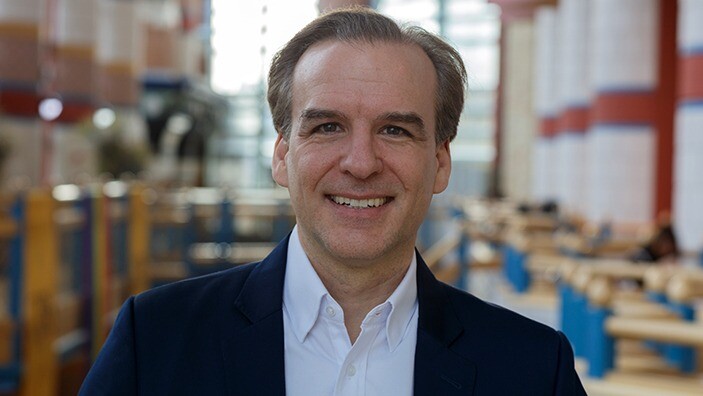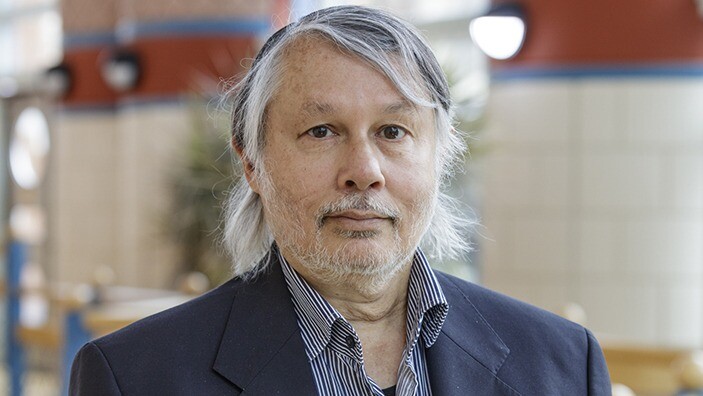It seems virtually impossible to avoid articles, broadcasts, podcasts and conferences that deal with how technology will affect the future of work. Such articles, in fact, increased 16-fold between 2018 and 2022 in fields such as business, economics and psychology – and there has been a further explosion of such articles since the launch of ChatGPT in November 2022, which brought generative artificial intelligence (AI) to the fore.
The combination of technology and the future of work is also ever-present in academic scholarship: searching various Academy of Management journals for articles that use the term ‘future of work’ produces associated words and phrases such as remote work, smart machine, technology, virtual and end of jobs.
But what about the human side of the future of work? Is that being forgotten, neglected or simply overwhelmed by the intense focus on how technology is changing the workplace?
Seeking a broader, human focus on the future of work

That’s the focus of research co-authored by Jochen Menges, Professor of Leadership at Cambridge Judge Business School and the University of Zurich, one of the guest editors of a special edition of the journal Academy of Management Discoveries, that focuses on this human side of the workplace.
“We seek a broader, human focus on the future of work, because the fixation on modern technologies such as generative AI can lead scholars, businesses and individuals to adopt a narrow perspective on the future of work based only on technology,” says Jochen, whose workplace research has ranged from an examination of emotions to charismatic leadership to the effect of family on worker motivation.
“Human imagination is boundless, so why constrain it to technology? Surely, technology is important to how workplaces evolve, but so are new ways of collaborating, of enhancing wellbeing, and of spurring innovation through human diversity. And, by better understanding how humans interact with technological changes rather than only on how tech interacts with people, we can lay the groundwork to accelerate the adoption of helpful and elevating new technologies for the benefit of people.”
Human imagination is boundless, so why constrain it to technology? Surely, technology is important to how workplaces evolve, but so are new ways of collaborating, of enhancing wellbeing, and of spurring innovation through human diversity.
Why the human side of the workplace needed fresh examination

Another Cambridge Judge faculty member, Prithviraj Chattopadhyay, Professor of Organisational Behaviour at the Business School, is the co-editor of Academy of Management Discoveries, one of several journals published by the Academy of Management.
“Academy of Management Discoveries welcomes exploratory research that looks at areas not adequately explained in existing theories of management and organisation, and to stimulate further analysis,” he says.
“The human side of the future of work is one such area that needed fresh examination, as this aspect of the workplace has been neglected as scholars focused on the latest technology. We can never forget that it’s human beings and not devices that ultimately define a workplace, a sector, an organisation, and a society.”
We can never forget that it’s human beings and not devices that ultimately define a workplace, a sector, an organisation, and a society.
The history of human capability is often considered in tech terms
Given the history of how the capabilities of humans are often considered in the context of technological advances, it’s not unusual that dialogue about the future of work focuses on technology.
As Jochen and his co-authors point out, citing various academic research over many decades:
- in Greek mythology, Prometheus stole fire from the Gods on Mount Olympus to provide people the ability to do metalwork, which then transformed everything from construction to agriculture to warfare
- historians have since the early 1800s used a 3-age system to measure human history by technological-industrial time periods based on human skill in stone, bronze and iron
- archaeologists look at technological innovation in categorising species’ level of advancement
Yet Jochen and his colleagues argue that it is too constraining to view the tech-human connection as technology dictating change to people, but rather that humans are at the centre of all processes, including technology, that will shape our futures. And some processes – from new ways of collaborating to flexing hierarchies to enhancing wellbeing – are about innovation in human-to-human interaction that’s devoid of any technology. So rather than only focusing on how technology shapes work and workplaces in the future, it is important to understand how people understand new technologies and engage with both tech and with each other to get their work done.
“These papers underscore opportunities to enrich research on the future of work by illuminating how humans shape technological advances through their imagination about what the future will hold and developing next generations of technologies in accordance with those expectations, how diverse human characteristics shape the effects of technological advances at work, and how human values can be challenged, maintained, or promoted as technology changes the world of work.”
How tech captured management thinking a century ago
Efforts by Jochen and his colleagues to broaden the tech-centred future of work narrative echoes what occurred a century ago among management thinkers and practitioners.
The groundbreaking 1911 book by American mechanical engineer Frederick Winslow Taylor, The Principles of Scientific Management, spearheaded the Efficiency Movement of industrial management centred on how applying engineering principles would help humans work more like machines and improve work output.
“Every single act of every workman can be reduced to a science,” Taylor wrote in his treatise. “For example, the average man would question whether there is much of any science in the work of shovelling. Yet there is but little doubt, if any intelligent reader of this paper were deliberately to set out to find what may be called the foundation of the science of shovelling, that with perhaps 15 to 20 hours of thought and analysis he would be almost sure to have arrived at the essence of this science.
“This science is so elementary as to be almost self-evident.”
Taylor suggested that such science could optimise work, ultimately feeding the development of technologies to enhance work outcomes through machines. And yet, some of these conclusions were soon cast into doubt when a series of experiments in the 1920s and 1930s at a Western Electric factory in Hawthorne, Illinois, ushered in new thinking about workplace productivity. The experiments suggested that human performance could be influenced by motivational factors such as leadership, job satisfaction and workers’ participation in the organisation.
The Hawthorne Studies ultimately led some scholars to look at humans in a new way, no longer treating them as an appendage to technology. It is this lineage of thinking that Jochen and his co-authors revive to emphasise the importance of people in the future of work.
“While technological developments are critically important to our future, so are people, and a better understanding how people shape a future of work that they want is as important as understanding the impact of technologies. As we explore what the future will hold, it will be paramount to innovate solutions for how people can feel and do better at work, as individuals, in groups, and across society.”
What are machines worth if they don’t enable a better future for people?
While machines promise greater consistency and efficiency in many tasks, “unless machines enable a better future for people, what is their worth?” ask Jochen and his co-authors, who seek to “broaden our understanding of the future of work, casting people not just as passive recipients of a technology-dominant future but rather as active cocreators of a future that serves them well”.
“Essentially, we suggest moving the question addressed in scholarship from “What will the future of work look like?” to questions like “How do human efforts create the future of work?” and “How can humanity be preserved in the future amidst changes?”
Work trends, algorithms and reactions to tech-enabled work
Broadly, the articles in the special report of Academy of Management Discoveries revolve around these themes:
- trends in the future of work
- how people respond to algorithmic management
- how people behave toward working enabled by technology
A paper by academics at KU Leuven in Belgium, BI Norwegian Business School, IESEG School of Management in France and Esade in Spain argues that “the future of work is a fiction, not a fact; or, better yet, a series of competing fictions prescribing what the future will or should look like”. The research calls for future of work research to shift from predictions to ‘imaginaries’ in order to counter deterministic understandings of the future of work.
Research from University of St Gallen in Switzerland looks at 2 megatrends that increasingly characterise the working world: remote work by many employees, and the need for inclusion, authenticity and belongingness in a diverse workforce. The results were nuanced: they found that, in general, employees who worked remotely more experienced more opportunity for authenticity and belongingness, but an increase in remote work led to lower belongingness within a single employee.
The impact of algorithmic management on employee behaviour
A paper from the University of Salzburg challenges research assumption on algorithmic human resource management (HRM) that algorithms do not influence the behaviour they are designed to predict. The research found, rather, that algorithmic HRM “incentivised workers to behave contrary to their own preferences”, that workers attributed their “discomfort with this outcome to the algorithmic personnel evaluation ignoring behaviour”, and that employees’ “attitudes toward the algorithm were not related to their behaviour”.
A paper from Northeastern University in the US finds that top managers believe employees working under algorithmic management are less capable of creative capacities, resulting in less innovation-budget allocation to algorithm-led teams compared to human-led teams. Thus, despite conventional wisdom that intelligent technologies boost innovation in general, “specific employees and teams associated with algorithmic management may be perceived and treated as lacking in creativity and as less deserving of resources for innovation”.
Employee behaviour in reacting to tech-related changes
Research from BI Norwegian Business School and EBS in Germany looks at the concept of voice in jobs on digital platforms in the gig economy. Voice is crucial for employees as it helps exert some influence over management decisions, and in the gig economy such voice takes form in online communities. Examining such communities, the research finds that gig economy workers frame their voice on such channels including signals of status, which creates different factions that amplify in-group members and mute out-group members.
A paper from the University of Toronto examines how tech developers interact with users to shape the effect of workplace technologies, and the role that power plays in such interactions. The research looks at how third-party developers navigate the different interests of managers and manufacturing workers by aligning the interests of the 2 groups while encoding the preference of workers into prototypes, and then take steps to limit the influence of managers pushing back against certain new features. The study calls for future research on developers as they exert considerable influence over both design and managerial control.
Shaping the future of technology-enabled work
“Taken together, these articles illustrate how human qualities and efforts in the here and now can shape the coming tide of technology-enabled work,” says the article by Jochen and his colleagues, which calls on management scholars to focus on 4 areas:
- to conceptualise the future of work, which is currently an amorphous term with multiple meanings to different scholars
- to study not only the implementation of technology and how it changes work, but also what happens prior to such implementation such as changes that occur after initial stages in the development of new technologies
- to seek an answer to a key question: “How do we maintain a focus on people in a world of work that seems increasingly determined by advances in technology?”
- to embrace human diversity in all its forms in order to fully appreciate the human forces shaping the future of work
“What we are essentially advocating is that we as scholars, and society more broadly, look beyond technological change to focus on how human factors including, for example, our emotions will reshape work practices as we move further into the 21st century,” says Jochen.
“We also need to look at basic human needs such as belongingness, and how these needs evolve in relation to the use of technology by organisations. Related to this, how do organisations approach worker skill development given the need to recruit both high-tech and low-tech talent, and what do members of these different talent pools think about their own career trajectories in an increasingly technological era?”
We also need to look at basic human needs such as belongingness, and how these needs evolve in relation to the use of technology by organisations.
Focus on the future of work at Cambridge Judge Business School
The future of work has long been an area of focus at Cambridge Judge Business School, including research on leadership, the dangers of bias in using AI, and how culture will remain vital to organisational performance and identity.
Cambridge Judge has launched an initiative, Human-Centric Approaches to the Future of Work, that addresses the challenges posed to organisations and their managers by both the rapid advancement of new technologies and novel organisational structures.
“It has become increasingly apparent that traditional modes of thinking and operating are no longer sufficient,” says the initiative’s web pages. “To help organisations prepare to tackle these challenges head-on, we have launched a data-focused, evidence-based initiative for future-oriented organisations who want to be proactive in their approach to learning and adapting to the changing landscape of the workplace.”
Cambridge Judge faculty involved in the initiative, in addition to Jochen Menges and Prithviraj Chattopadhyay, include:
- Patrizia Vecchi, Assistant Professor in Organisational Behaviour
- David Stillwell, Professor of Computational Social Science
- Andreas Richter, Professor of Organisational Behaviour
- Yeun Joon Kim, Associate Professor in Organisational Behaviour
- Elizabeth George, KPMG Professor of Management Studies
- Vincent Mak, Professor of Marketing and Decision Sciences
A recent issue of Harvard Business Review featured an article on practical ways to help employees in distress, co-authored by Thomas Roulet, Professor of Organisational Sociology and Leadership. It also included an article on how an innovation toolkit can help meet strategic goals, co-authored by Haijian Si, a Business Doctorate candidate at Cambridge Judge, Christoph Loch, Professor of Operations and Technology Management and former Director (Dean) at the Business School, and Stelios Kavadias, Margaret Thatcher Professor of Enterprise Studies in Innovation and Growth.
“Cambridge Judge is very proud that its expertise covers a broad spectrum of sectors ranging from marketing to healthcare to energy, but we know that the future of work is an overarching topic of interest to people not only in those industries but also in every other sector of society,” says Paul Tracey, Professor of Innovation and Organisation and Vice Dean for Research and Impact at Cambridge Judge.
Our faculty
Cambridge Judge has a world-class faculty of over 80 members, representing 6 continents, with research interests that span the full spectrum of business issues.
Related content
Menges, J.I., Howe, L.C., Hall, E., Jachimowicz, J.M., Parker, S.K., Takeuchi, R., Vadera, A.K., Whillans, A. and Cohen, S.K. (2024) “The human side of the future of work: understanding the role people play in shaping a changing world.” Academy of Management Discoveries
Menges, J.I., Howe, L.C., Hall, E., Jachimowicz, J.M., Parker, S.K., Takeuchi, R., Vadera, A.K., Whillans, A. and Cohen, S.K. (eds.) (2024) Academy of Management Discoveries, 10(3)
Human-Centric Approaches to the Future of Work
An initiative addressing the challenge posed by new technologies and organisational structures by offering a data-focused, evidence-based initiative for forward-thinking organisations.





